© 2014 Gary Smith Fishing Ltd All Rights Reserved





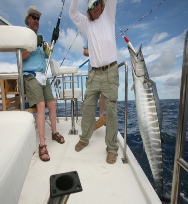
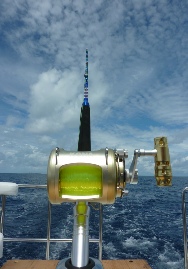
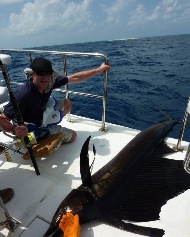
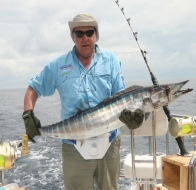

Proudly Associated With

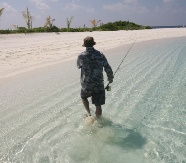
Following on from last weeks competition preparation feature here is an insight into competition fishing in the Mediterranean. Competitions usually start in winter months at six or seven o’clock at night continuing until midnight or one o’clock in the morning. In summer the competitions start at eight o’clock at night until eight the next morning. When loading up the car with all the tackle required for the event, rods, reels, bag, bucket, cool bag, trolley etc its is a good idea to have a check list - forgetting something can be disastrous. You will usually find that other competitors will help you out but this is competitive and it is up to you to make sure you have everything required with you. At two o’clock in the morning it is difficult to find new batteries for your headlight miles from anywhere on a beach!
Next thing is to pick up the worm baits from my supplier ANJU Sport Fishing. These were pre-ordered on Monday and will have been delivered and preserved in a refrigerator to make sure they are as fresh as possible. A cool bag or box is required with the suitable amount of ice blocks in for the length of time the competition lasts for plus the added time of the weigh in and the journey home. Any worms not used, if kept refrigerated, can be used for practice the following week. The amount of bait will depend on what type of underwater terrain the competition takes place over. Maybe ten or twelve boxes of worms will cover all eventualities. If the fish are not feeding on one type of worm they may fancy another variety. Off now to the draw for my peg number, if the competition is a local club competition this will be at the Fishing Club of Puerto De Mazarron. If not it could be an hours drive away so to be allocated your peg number you must be at the draw at the specified time stated in the regulations for the competition. If you’re late you do not compete. It is as simple as that. The organisers will also require you to produce your club membership card, regional federation membership card and any other documentation required. If it is a doubles match make sure your team mate is there at the required time also.
Once the peg number is drawn there is usually an hour or so to enable you to get set up before the stated start time. So travel to the selected venue, find your peg number and unload all the equipment required. Have a look at the shore line and determine if the tide is coming in or out. The Mediterranean down in this part of Spain, in normal conditions, only has a tidal movement of two metres or so but you do not want to be all set up fishing and realize that everything is too close and will have to be moved back to avoid getting wet – time wasted. Two rods to fish with is the norm here and sometimes I set another rod up facing away from the sea if for the first hour I am fishing close in with a thicker line. It saves time changing spools by having another rod and reel ready to swop over as darkness falls. It is important to have everything to hand for any fishing sessions; I have a trolley with a folding table attached. This is good as it gives me a place to work, be it loading worm baits or tying knots. My bag sits on the trolley and I know where everything is after dark. I set up a bait stand; this is a T bar with hooks on to hang terminal rigs ready for use loaded with bait and weight. When I reel in I simply unclip the rig from the main line and change it for one of the stand and cast out. The less time bait is out of the water the better, stands to reason no bait in the water and you will not catch fish. So all set up the hooter or firework goes and cast out the lines, hopefully a successful competition will follow.
Tactics are something you will learn as you go along. You cannot buy experience but watch others around you, see what they do, how often they change the bait, how far they are casting. Fishing craft, as I call it, is something you can learn by maybe a course with an instructor or just time fishing, getting the feel of your rods and reels, when to reel in a few turns to attract passing fish or leave be and let the fish come to the bait. It is all experience building and makes you a more successful fisherman. Standing alone for hours on end at the sea shore on a lonely beach is fine but you will learn more by fishing with a friend or joining a club and sharing information between you. It is also wise to try fishing at night if you have never experienced it as there are more fish about at night.
One thing I always have with me at competitions is warm clothing; I learnt a valuable lesson at an all night competition last September. The start of the event was in thirty plus degrees but by three in the morning it was down to nine degrees and, with tiredness setting in, it felt very cold. Once you get cold to the bone it is difficult to recover until the sun comes up. Whatever time of year it is, take a flask of warm drink, a little food and substantial clothing. The hooter blows to signal the end of the competition, reel the lines in gather all your equipment up and put the fish caught in the bag supplied by the organisers. Usually an official will come and seal the bag and take it away to the weigh in. Another bag will be supplied by the organisers for your rubbish. This is very important, I have gone to beaches where empty worm boxes are strewn about and fish hooks lay in the sand……….very dangerous, pick all your rubbish up and put it in a bin. Once packed up, go to the weigh in and see the outcome of your hard work. Sometimes good, sometimes bad, lady luck does play a part but if everything is prepared properly it makes competition fishing a lot easier. Then travel home and look forward to the next event. The anticipation starts all over again.
Registered Copyright © Gary Smith & Luigi Mateos
Back
| Address |
| Contact Us |
